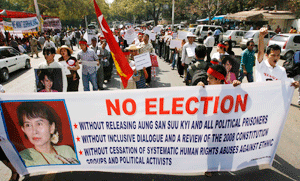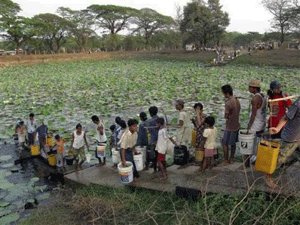
| APRIL, 2010 - VOLUME 18 NO.4 |
NLD Says ‘No’ to Election
 |
| Pro-democracy activists denounce the Burmese election protest in New Delhi on march 17. (Reuters) |
Redshirts Rally in Bangkok
 |
| Redshirt supporters of deposed Thai premier Thaksin Shinawatra take part in an anti-government protest in Bangkok on March 20. (Photo: AP) |
Asean to End Nargis Aid
 |
| Villagers carry drinking water in plastic containers from a lake in Dala Township in the Irrawaddy delta on March 21. (Photo AP) |
Regime May Outlaw UWSA
The Burmese military junta is reportedly considering the option of outlawing the country’s largest ethnic armed group, the United Wa State Army (UWSA), if it fails to agree to the regime’s order to join the planned border guard force. If the UWSA is officially outlawed, the way is open to military action against the armed group, which has an estimated 20,000 to 30,000 troops in Shan State. Regime officials are said to have appealed to China to help persuade the Wa to accept the plan. In the face of rising tension along the Sino-Burmese border, the Chinese People’s Liberation Army has alerted its troops to monitor the situation closely.
UN Envoy Seeks War Crimes Commission
Tomás Ojea Quintana, the UN special rapporteur on human rights in Burma, has called for an international inquiry into possible war crimes and crimes against humanity committed by the ruling Burmese junta. He said a pattern of gross and systematic violations of fundamental freedoms continued in the country. Activist groups welcomed his recommendation, calling it unprecedented since the United Nations established a mandate to look into human rights violations in Burma in 1992.
Tension Rises in Kachin State
 |
| Tomás Ojea Quintana |
Junta Releases American
A Burmese-American activist was unexpectedly released on March 18, a day after his lawyer filed an appeal against a three-year prison sentence he received in February. Nyi Nyi Aung, a 40-year-old activist, had worked full-time in recent years from his Maryland home, funded by grants, to promote democracy in Burma. A political refugee, he became a US citizen in 2002 after seeking asylum but has traveled back to his homeland several times without incident. He was arrested on Sept. 3, 2009, after arriving at Rangoon’s international airport on a flight from Bangkok. He said he was tortured while undergoing interrogation at Insein Prison and last December launched a hunger strike to protest against conditions for political prisoners in Burma.
Cambodia to Build Memorial for Journalists
Cambodia will erect a memorial to nearly 40 foreign and Cambodian journalists who died covering a savage five-year war that ended with the triumph of the Khmer Rouge 35 years ago. The groundbreaking for the monument will take place at the end of April, the anniversary of the Khmer Rouge victory, as foreign journalists who covered the conflict gather for a reunion. At least 37 journalists were killed or are listed as missing from the 1970-75 war, which pitted the US-backed Lon Nol government against the North Vietnamese-supported Khmer Rouge. They included reporters, photographers and television cameramen from Japan, France, the United States, Switzerland, Germany, Austria, India, Laos, Australia and Cambodia. A number of the journalists were captured by the Khmer Rouge and never seen again.
Google Ends Censorship in China
 |
| A supporter presents fowers near Google’s offce in Hong Kong on Jan. 14. (Photo: AP) |
China Drills More Wells, Seeds Clouds Amid Drought
Emergency wells were being drilled and cloud-seeding operations carried out in southern China, where the worst drought in decades has left millions of people without water. The drought, which has left southwestern China suffering since last year, has affected about 61 million people and left more than 12 million acres (about 5 million hectares) barren in Guizhou, Yunnan, Sichuan, Chongqing and Guangxi. For parts of Yunnan, it is the worst drought in a century, with about 5.4 million people facing water shortages according to a director at the Yunnan Land Resources Bureau. China’s large land mass means drought can occur in one region while others have record-breaking temperatures and severe storms that can cause floods. A massive sandstorm in late March covered Beijing and other cities in northern China in a layer of sand and grit.
Than Shwe Sets Ground Rules for Polls
At an Armed Forces Day speech in Naypyidaw on March 27, Burma’s junta chief warned political parties to behave while campaigning for elections later this year, adding that the armed forces can take part in politics “whenever the need arises.” In his seven-minute speech, Snr-Gen Than Shwe also warned the international community against meddling in the upcoming election and said “divisive acts” could spark anarchy and derail the transition to democracy. Than Shwe did not reveal a date for the election. The 77-year-old regime strongman rarely speaks in public, except at Armed Forces Day ceremonies.